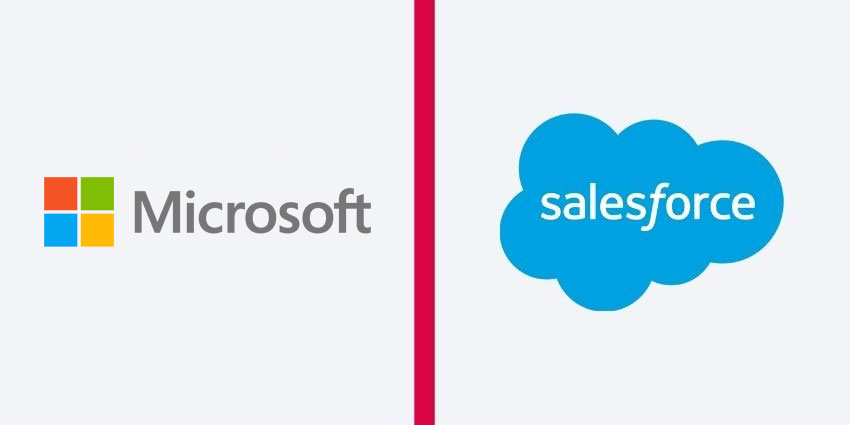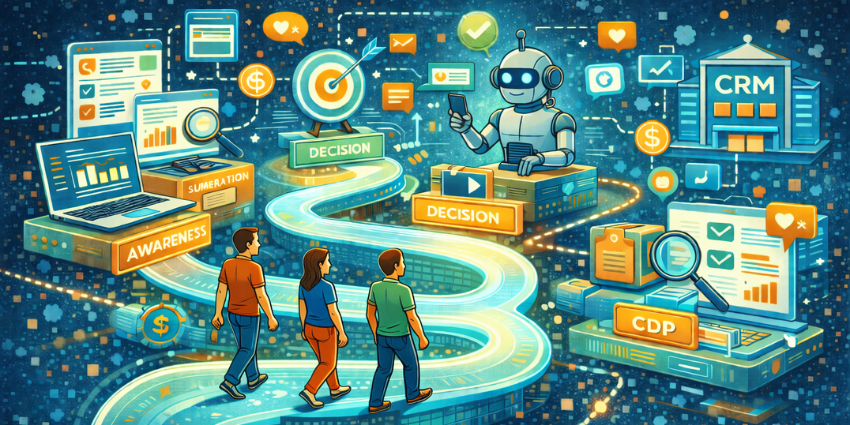Salesforce is the biggest CRM provider in the world, according to 2025 IDC data. Its closest rival? Microsoft.
That said, there’s still quite a gap between the two vendors in CRM revenues. Last year, Salesforce raked in $21.6BN. Meanwhile, Microsoft earned $5.45BN.
Nevertheless, Microsoft did achieve higher CRM revenue growth in 2024, up 11.5 percent year-over-year (YoY). Comparatively, Salesforce’s CRM earnings rose by 9.5 percent.
There are several reasons a business may choose Microsoft for CRM. For starters, consider its familiar UI, multiple deployment options, and broader, interconnected Dynamics 365 portfolio.
That portfolio includes an ERP, enabling converged, first-party workflows that run across the two crucial data systems. Salesforce can’t offer that.
However, Salesforce brings a lot of its own differentiators to the table. For instance, it’s the most comprehensive CRM platform on the market, connects seamlessly with Slack, Tableau, and MuleSoft, and has a vision for a more predictive, prescriptive CRM category.
Against that backdrop, here’s a closer look at how Microsoft and Salesforce really stack up.
Microsoft vs. Salesforce: A Quick Overview
Most CRM market reports frame Microsoft and Salesforce as CRM leaders, not just in their revenue, but in their portfolio depth, vision, and worldwide support services.
For instance, both earned the position of “Leader” in the 2024 Gartner Magic Quadrants focusing on CRMs for marketing, sales, and customer service.
The tech giants were also named at the forefront of Forrester’s 2025 Wave for CRM software.
Generally, these reports praise Microsoft’s CRM solutions for their deep integrations with the broader Dynamics 365 portfolio, in addition to Microsoft Teams, Power, and Copilot Studio.
Plus, Microsoft’s tools are user-friendly and relatively cost-effective compared to those offered by Salesforce, especially after its latest price hikes.
That said, Salesforce has significant advantages in platform depth, scalability, and ecosystem.
Microsoft vs. Salesforce: Customer Service CRMs
A customer service CRM manages cases, stores data, and powers workflows for smoother customer support and agent journeys.
Microsoft Dynamics 365 Customer Service and Salesforce Service Cloud are the vendors’ respective CRM solutions in this category.
Microsoft Dynamics 365 Customer Service: Strengths and Cautions
Microsoft’s take on customer service is a little more understated, at first glance. But Microsoft is innovating quickly, attempting to catch up.
For instance, companies can now access native AI agents, design their own AI agents with Copilot Studio, and leverage a native Copilot to draft customer emails, automate post-contact summaries, and more.
Plus, the new Dynamics 365 Contact Center aligns closely with the CRM, enabling Microsoft to own more of the service stack than its competitors, including Salesforce.
Beyond that, Microsoft’s tools benefit from deep integrations with Office 365, Teams, Outlook, and Azure. For any organization already heavily in the Microsoft ecosystem, that’s a huge plus. It’s also appealing for IT leaders managing everything on Azure.
In its industry studies, Gartner notes that Microsoft is especially strong in unified agent experiences and “cohesive cloud infrastructure”.
Finally, Microsoft has developed a smooth onboarding process for Dynamics 365, which aligns well with its strengths in intuitivity.
However, its marketplace and features lack the depth of Salesforce, while its reporting and workflow automation tools are clunkier.
Salesforce Service Cloud: Strengths and Cautions
Salesforce Service Cloud is still the go-to customer support CRM for enterprises wanting deep customization and advanced capabilities.
Indeed, the platform is about much more than routing tickets and managing cases. Instead, it brings in AI, automation, and integrations from its vast AppExchange to create seriously capable end-to-end fulfillment workflows.
Salesforce is also pushing to use its Service Cloud technology to solve not just customer cases, but also employee cases, as evident in the recent release of an Employee Service module within the CRM.
The company also offers access to extensive deployment resources (a huge partner network), industry-specific offerings, and advanced analytics tools, boosted by its adjacent Tableau product.
However, the number one differentiator is its platform depth, which is boosted by Service Cloud’s unique product discovery tool: My Service Journey. This supports service teams in plotting out a roadmap while unlocking the most relevant tools for their operation.
However, on G2, Salesforce Service Cloud scores 4.4 out of five stars (as of July 2025), slightly lower than Microsoft Dynamics Customer Service’s rating of 4.5 stars.
Part of the reason for this is the complexity of Salesforce’s tools. Onboarding can be complex, especially for smaller teams, and costs can climb fast, thanks to its layer-cake pricing model.
Microsoft vs. Salesforce: Sales CRMs
A sales CRM comprises tools to support sales teams as they complete tasks, admin, and workflows. In many cases, the CRM will automate a lot of that work, too.
Microsoft Dynamics 365 Sales and Salesforce Sales Cloud are the vendors’ respective CRM solutions in this category.
Microsoft Dynamics 365 Sales: Strengths and Cautions
Microsoft’s sales product prioritizes simplicity and easy-to-implement AI capabilities. Like Microsoft’s other tools, the Dynamics 365 Sales platform can easily connect to tools like Microsoft Teams, Outlook, and the Power Platform.
Also, it comes with various intuitive AI solutions built-in, such as Microsoft Copilot for Sales, with lead and opportunity summary insights. Plus, companies have the freedom to build their own AI agents with Copilot Studio or leverage preconfigured prototypes, including Sales Agent and Sales Chat.
Yet, what makes Microsoft’s sales CRM stand out is how comparatively easy many of the capabilities are to leverage. Features like Smart Paste (which allow reps to copy details from external docs and use AI to fill in CRM fields automatically) save users significant time and effort.
That said, the platform as a whole isn’t customization-friendly. Moreover, Dynamics 365 Sales doesn’t support ML training on custom data, and there are no options for custom prompts and entities. The forecasting tools aren’t nearly as robust as those from Salesforce either.
Plus, Microsoft’s mobile app for sales teams hasn’t been updated as much as the desktop version over the years, which may be a problem for field-based teams.
Salesforce Sales Cloud: Strengths and Cautions
Salesforce has long stood as the go-to leader in sales tech. The Salesforce Sales Cloud is everything its reputation promises. It combines forecasting tools, pipeline management, territory planning, CPQ solutions, and more. The roadmap even includes “Forecast Anything” for cross-model revenue insights, automatic prospecting with AI, and more.
The CRM leader also stands out for its depth, global footprint, and strong community of users.
Additionally, Salesforce makes it easy for companies to customize their AI workflows, with support for multiple external LLMs, and a bring-your-own model approach, as well as custom prompt and action creation.
Still, there are some limitations in Salesforce’s machine learning models, in many cases, forcing companies to work alongside partners or data scientists to enhance model solutions.
The user experience has some issues, too. Reviews on sites like G2 and TrustRadius regularly point out that the system can be overwhelming. And unless users have serious admin support, it’s easy to leave features unused, which results in avoidable costs.
Microsoft vs. Salesforce: Marketing CRMs
A marketing CRM supports a brand’s demand-gen initiatives, helping them build awareness, develop leads, and enable omnichannel engagement.
Microsoft Dynamics 365 Customer Insight and Salesforce Sales Cloud are the vendors’ respective CRM solutions in this category.
Microsoft Dynamics 365 Customer Insight: Strengths and Cautions
Since 2023, Microsoft has combined its marketing automation platform with its customer data platform, introducing the new “Dynamics 365 Customer Insights” solution. With this, Microsoft empowers companies to deliver optimized and cohesive engagements across channels.
Like Salesforce, Microsoft gives companies state-of-the-art AI tools they can use for channel selection, segmentation, automation, and content creation.
With the latest Copilot Studio updates, Microsoft now allows marketers – alongside sales and service teams – to build AI agents that can even interact with desktop apps, offering a level of automation that’s just starting to show its potential.
Plus, the fact that Microsoft’s platform seamlessly aligns customer data across sales, marketing, and customer service functions makes it easier to create a unified view of buyers, without extra investment.
However, some customers say that Microsoft’s marketing tools are a little more complex than they’d like, even if the initial installation may be simpler than with Salesforce Marketing Cloud.
Additionally, Microsoft doesn’t offer quite as much personalization or as many integration options as Salesforce, making it less appealing to companies with more complex workflows.
Salesforce Marketing Cloud: Strengths and Cautions
Like most of the tools from Salesforce, the Marketing Cloud is feature-rich and built specifically for larger enterprises. Whether it’s email journeys, SMS campaigns, or dynamic content targeting, this platform can handle it all.
Marketers can also now deploy ready-to-go AI agents to handle campaign planning, segmentation, and even performance reporting.
Plus, Salesforce gives companies the freedom to experiment with APIs, create content with AI, and build multi-step journey workflows.
The biggest issues overall are expense and complexity. Making the most of Salesforce Marketing Cloud generally requires companies to invest in the Salesforce Customer 360 and Data Cloud, too.
Also, working with APIs and integrations does require some technical knowledge. User reviews often mention steep learning curves and the need for specialist support.
Microsoft vs. Salesforce: Who Wins the CRM Battle?
Salesforce still wears the CRM crown. The features run deep, the AI is ambitious, and the momentum is hard to ignore. With preconfigured Agentforce agents rolling out across every cloud, Salesforce is clearly focused on maintaining its position as a market leader.
But Microsoft is no longer in the shadows. Dynamics 365 is proving it can compete in sales, marketing, and service, with an often more affordable approach. Its AI agents aren’t be to sniffed at either.
So, while enterprises chasing scale and deep customization will likely stick with Salesforce, there is a case for many to pick Microsoft, especially those brands that are looking for a speedy rollout and are already investing in the Microsoft ecosystem.







